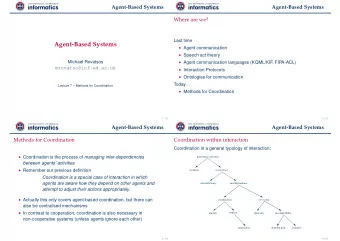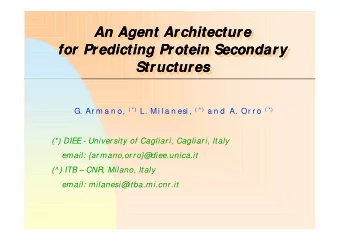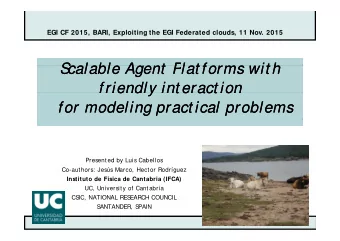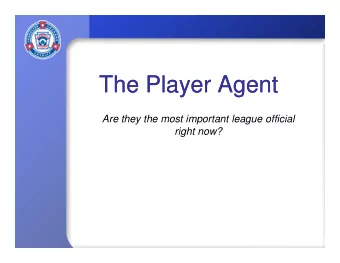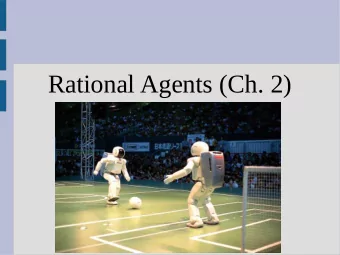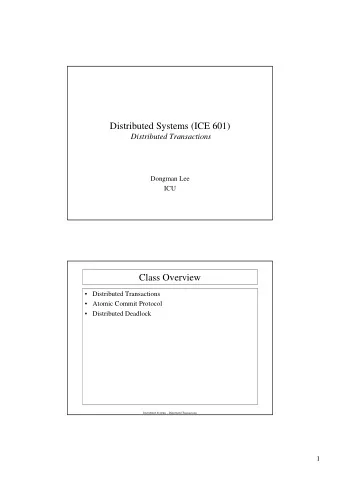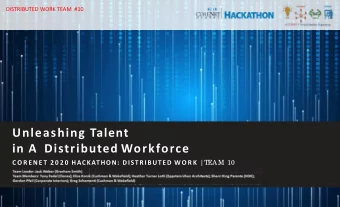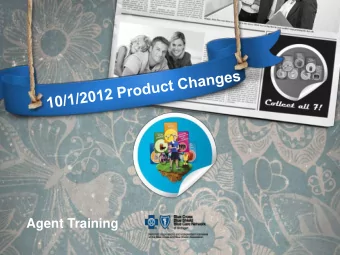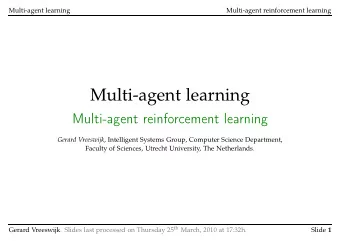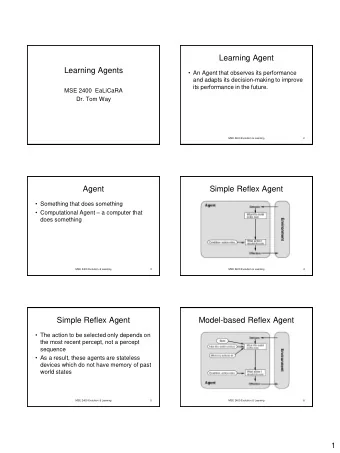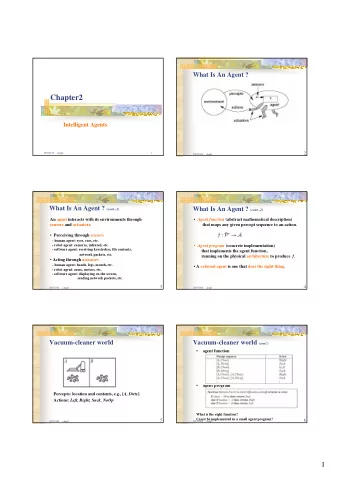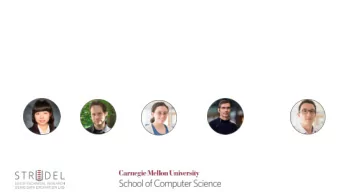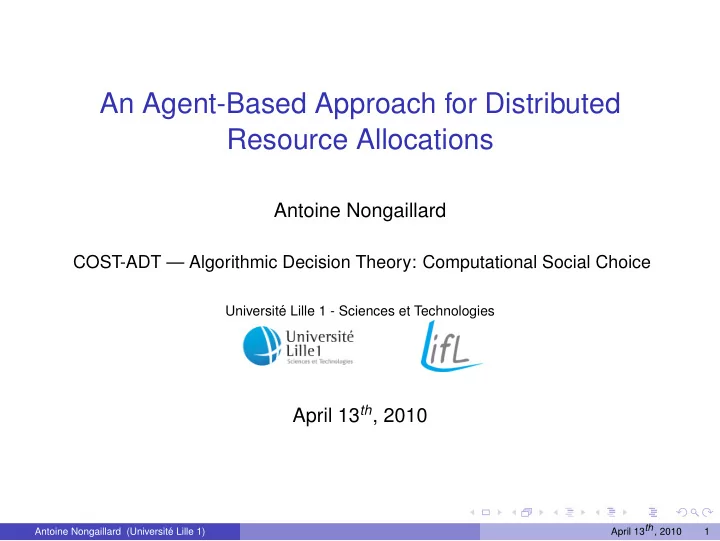
An Agent-Based Approach for Distributed Resource Allocations - PowerPoint PPT Presentation
An Agent-Based Approach for Distributed Resource Allocations Antoine Nongaillard COST-ADT Algorithmic Decision Theory: Computational Social Choice Universit e Lille 1 - Sciences et Technologies April 13 th , 2010 April 13 th , 2010
An Agent-Based Approach for Distributed Resource Allocations Antoine Nongaillard COST-ADT — Algorithmic Decision Theory: Computational Social Choice Universit´ e Lille 1 - Sciences et Technologies April 13 th , 2010 April 13 th , 2010 Antoine Nongaillard (Universit´ e Lille 1) 1
Outline Context 1 Contributions 2 Results 3 Conclusion & future works 4 April 13 th , 2010 Antoine Nongaillard (Universit´ e Lille 1) 2
Resource allocations pref u A ✜ ♠ ✚ ✒ Resource Set R A ✗ pref u C ♣ ♠ ✦ � � C ✚ ✒ ✗ pref u B � ✦ B B Entity Set P A ♣ � ✜ C Resource allocation April 13 th , 2010 Antoine Nongaillard (Universit´ e Lille 1) 3
An example Resource Set R Population P r 1 r 2 r 3 r 4 r 5 r 6 A 10 7 10 9 2 1 B 6 10 3 4 8 6 C 1 2 1 2 1 3 Social welfare Optimal allocation Utilitarian (sum) [ { r 1 , r 3 , r 4 } , { r 2 , r 5 , r 6 } , {} ] [ { r 1 } , { r 5 } , { r 2 , r 3 , r 4 , r 6 } ] Egalitarian (min) Nash (prod) [ { r 1 , r 3 } , { r 2 , r 5 } , { r 4 , r 6 } ] Elitist (max) [ { r 1 , r 2 , r 3 , r 4 , r 5 , r 6 } , {} , {} ] April 13 th , 2010 Antoine Nongaillard (Universit´ e Lille 1) 4
State of the Art Studies on resource allocation problems are mainly theoretical. In literature [Sandholm,1998] : Existence of transaction sequences [Dunne,2005] : Complexity [Chevaleyre et al., 2006 to 2009] : Identification of characteristics ensuring the existence of a transaction path Our assumptions Restrictions on communications Private information ⇒ Limited view of the system April 13 th , 2010 Antoine Nongaillard (Universit´ e Lille 1) 5
Research Objectives My thesis objective is to design a distributed mechanism based on local transactions leading agent negotiations to socially optimal allocations . I identify four important parameters: Transactions : what agents can offer during a negotiation? A behavior : how agents interact to determine acceptable transactions? A criterion : agents have a local knowledge only A social graph : agents have a limited neighborhood. April 13 th , 2010 Antoine Nongaillard (Universit´ e Lille 1) 6
Transactions Model based on offers’ cardinality (e.g. � 1 , 0 � = gifts, . . . ) Agent behaviors Rooted / frivolous Stubborn / flexible Priority on partners / Offers / transaction kinds Decision-making criteria Individual rationality Sociability Contact graphs Complete Grid Erd˝ os-R´ enyi Small world April 13 th , 2010 Antoine Nongaillard (Universit´ e Lille 1) 7
Utilitarian and elitist negotiations Elitist negotiations on complete graphs Elitist negotiation processes based on complete social graphs always converge towards a global optimum using social clusters of maximal size. Utilitarian negotiations on complete graphs Utilitarian negotiation processes based on complete social graphs always converges towards a global optimum using only social gifts. No path on restricted graphs Negotiations on restricted graphs cannot ensure the achievement of socially optimal allocations, independently of the social notion considered. April 13 th , 2010 Antoine Nongaillard (Universit´ e Lille 1) 8
Egalitarian and Nash negotiations Bilateral transaction insufficiency on complete graphs During egalitarian or Nash negotiations, bilateral transactions cannot ensure the achievement of optimal allocations. { r 1 } Resource Set R A Population P r 1 r 2 r 3 A 2 1 5 B 5 2 1 B C C 1 5 2 { r 2 } { r 3 } April 13 th , 2010 Antoine Nongaillard (Universit´ e Lille 1) 9
Efficiency of egalitarian negotiations Simulations are performed on population of 50 agents where 250 resources are available. Efficiency (%) of negotiation processes Social graph Rational Social � 1 , 1 � ≤ � 2 , 2 � � 1 , 0 � � 1 , 1 � ≤ � 1 , 1 � ≤ � 2 , 2 � kind Complete 19.3 20.8 78.5 24.1 99.9 99.9 Grid 13.9 14.6 66.2 23.6 80.2 80.6 Erd˝ os-R´ enyi 17.4 20.2 77.3 23.8 96.1 96.6 Small world 13.1 13.9 63.8 23.4 78.1 78.2 April 13 th , 2010 Antoine Nongaillard (Universit´ e Lille 1) 10
Conclusion Social welfare notions Utilitarian (sum) Egalitarian (min) Nash (prod) Elitist (max) Trivial Trivial NP -hard problem NP -hard problem Centralized Algorithm Allocation of each Allocation of all resources (on complete graph) Estimation using linear resource to one of the Accurate estimation quite to the agents who agents who estimates it program difficult estimates them the most the most Social criterion Social criterion Social criterion Social criterion Agent features Gifts Gifts and swaps Gifts and swaps Clusters Distributed Approach Frivolous and flexible Frivolous and flexible Frivolous and flexible Frivolous Optimal on complete Bilateral transactions graphs Bilateral transactions Optimal on complete unsufficiency unsufficiency graphs Very scalable Requires a hight mean Sensitive to bottlenecks Characteristics More than 86% for graph connectivity Sensitive to the mean with a very weak connectivity Requires a high mean connectivity Sensitive to graph connectivity bottlenecks Sensitive to the intial allocation Generosity is essential in all cases April 13 th , 2010 Antoine Nongaillard (Universit´ e Lille 1) 11
Future Works Based on my thesis, different facets of social web applications can be investigated. Preferences and topologies Preferences and externalities More expressive preferences Dynamic environment April 13 th , 2010 Antoine Nongaillard (Universit´ e Lille 1) 12
Thanks Contact antoine.nongaillard@lifl.fr Research Team SMAC: http://www.lifl.fr/SMAC/ Publications: http://www.lifl.fr/SMAC/publications/ Boss: philippe.mathieu@lifl.fr April 13 th , 2010 Antoine Nongaillard (Universit´ e Lille 1) 13
Recommend
More recommend
Explore More Topics
Stay informed with curated content and fresh updates.

